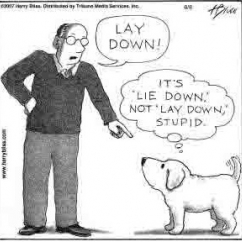Articles and News
JEWELERS, GIVE US YOUR OPINION: WOULD YOU HIRE SOMEONE WHO USES POOR GRAMMAR? | July 25, 2012 (0 comments)

Merrick, NY—Everything is going just as you'd hoped: the candidate you're interviewing has a winning attitude and a great resume, you feel he or she is likely to be a good fit for the staff, and your gut says this might just be "the one" you've been hoping will fill a hole in your sales team. Then the candidate enthusiastically gushes, "I seen your new video on YouTube and it's great!"
Ouch. Will poor grammar kill the deal?
A post on the subject last week by Kyle Wiens, a Harvard Business Review blogger and owner of ifixit.com, has gone somewhat viral, with business experts arguing both for and against hiring someone who may not have aced high school English. Wiens advocates zero tolerance for poor grammar, believing that someone who hasn’t learned to distinguish between to, too, and two probably won’t be very good at learning other skills needed to do a job. And someone who does know the difference but doesn’t bother to check his or her spelling, well, that’s just unacceptably sloppy. Especially, he argues, in an era where just about anything can be looked up online. (He does make exceptions for candidates who are dyslexic or not native English speakers.)
But someone who makes fewer mistakes on a grammar test, he says, will make fewer mistakes everywhere else in the job, even if it’s unrelated to writing.
Yet not everybody agrees that good grammar is indicative of a good employee. While Wiens believes it’s the best way to weed out candidates who really are detail-oriented from those who just say they are, responses to his post argue that many creative people aren’t detail oriented, nor should they have to be. Their job is to think of new ideas, to innovate, to imagine the “what if”—and leave the details of execution up to someone else better suited to soldier the process through.
As an editor, naturally I can’t resist throwing in my two cents’ worth on this topic.
Poor grammar sounds like nails on a chalkboard to me, but I don’t agree with Wiens’ view that good grammar is the litmus test for being detail-oriented. There are many ways to tell if someone is detail oriented. For example, math skills: I’m willing to bet any good CPA is pretty detail oriented even if they didn’t win a spelling bee.
Or, as I learned in my years as a manager, look at past behavior and experience for an indicator of future performance. Does the candidate have success in areas that require close attention to detail? For example, have they run events, fixed an engine, managed production, played music on stage, merchandised a showcase, or reared children? To do any of those things well requires close attention to detail.
Obviously, there are many positions where correct grammar is a must, both spoken and written, and anything less is unacceptable. But for a position that isn’t public facing and requires a very specific skill, even I would look for the skill first and the grammar second. Does a stone setter or a bench jeweler need to understand the subtleties of when to use a comma vs. a semicolon? Not if their job doesn’t require it.
I do believe proper grammar is essential for any public-facing position, especially in a luxury business. This is a person who will be representing your brand to a clientele that’s likely to be well educated themselves, and improper grammar is an immediate turnoff. Even subconsciously, customers have more respect for someone who is well spoken than someone who isn’t.
Of course, Wiens is right about cutting some slack for the candidate who’s not a native English speaker. Often, you will find they’re the most anxious to learn how to say something properly. Be eager to teach; they’ll make it a point to remember. And while I'm not an expert on learning disabilities, I've known a number of dyslexics who are well spoken even if they struggle with the written word.
Finally, what about that written word? There are enough online resources to answer any grammar, usage, or punctuation questions you may have, so there really is no excuse for mistakes. Don’t use “text-ese” in business communication, no matter how informal, and emails also should be written according to the same rules of punctuation and form as paper correspondence. The poet ee cummings can get away with all lower-case correspondence; we can't.
Another tip: don’t just rely on your computer’s spell-check feature to do your proofreading for you. It only picks up misspelled words, not misused words. So if you hurriedly email a customer to say there watch is ready when you meant their watch, they’re not going to realize it’s a typo, they’ll just think you flunked English.
Would you hire someone who uses poor grammar? The Centurion wants to know your thoughts. Please join our community and comment below.
Cartoon image: Harry Blass, distributed by Tribune Media Services, courtesy of American Culture Explained.







